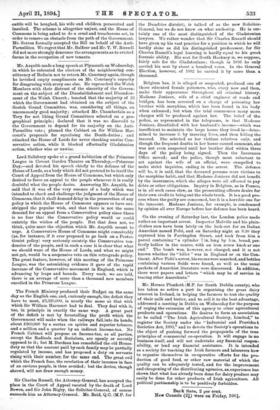Belgium has, it is alleged or suspected, produced one of
those educated female poisoners, who, every now and then, make their appearance throughout all criminal history. Madame Joniaux, wife of a chief engineer of roads and bridges, has been arrested on a charge of poisoning her brother with morphine, which has been found in his body when exhumed; but when the trial commences many more charges will be produced against her. The belief of the police, as represented in the telegrams, is that Madame Jonianx, dissatisfied with her husband's income—which was insufficient to maintain the large house they lived in—deter- mined to increase it by insuring lives, and then killing the insured. She selected as her victims relatives only, and though the frequent deaths in her house caused comment, she was not even suspected until her brother died within three days of the policy being signed. Then the Insurance Office moved; and the police, though most reluctant to act against the wife of an official, were compelled to make strict inquiries, ending in the arrest. The defence will be, it is said, that the deceased persons were victims to the morphine habit, and that Madame Joniaux did not benefit by the insurances, which she alleges were all effected to pay debts or other obligations. Inquiry in Belgium, as in France, is in all such cases slow, as the prosecuting officers desire for their own credit to bring out the whole truth. It is a good pro- cess where the guilty are concerned, but it is a horrible one for the innocent. Madame Joniaux, for example, is condemned by opinion all over Europe before her defence has been heard.


































 Previous page
Previous page